A fine continuation of the first book. The only negative note I have is that I want more!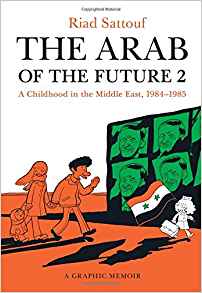
Category: Nonfiction
The Righteous Mind
This book was recommended to me by a friend, and I’ll recommend it to you. There’s a lot here, so I won’t try to unpack it all. But, the basic core here is that it’s 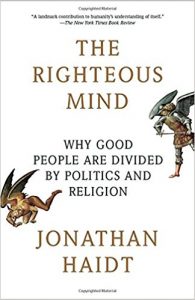 a book about moral psychology, or what you might call an empirical look at human morality. The author argues that different cultures and groups (he puts especial focus on liberals vs. conservatives vs. libertarians) often disagree because their moral frameworks emphasize different aspects of shared moral values. This is interesting on its own, but Haidt adds an argument about how and why humans tend to view their personal moral value system as the only true one, which results in uncooperative “righteous” behavior.
a book about moral psychology, or what you might call an empirical look at human morality. The author argues that different cultures and groups (he puts especial focus on liberals vs. conservatives vs. libertarians) often disagree because their moral frameworks emphasize different aspects of shared moral values. This is interesting on its own, but Haidt adds an argument about how and why humans tend to view their personal moral value system as the only true one, which results in uncooperative “righteous” behavior.
This is an interesting approach, especially in that it turns what most people would call “outrage” into “righteousness” which reframes it in a way that’s interesting to consider.
I’m not sure I’m down for all of it. In particular, there’s an argument about group selection that (like a lot of arguments about multi-level selection theory) seems to me to be semantic to a large degree, and perhaps to overplay the idea that group selection is some sort of scientific heresy. At least in my experience talking to biologists, the general view has been “there’s a version of group selection that, if defined the right way, we all accept.” But, maybe that’s my limited view as someone who wasn’t a biologist in the 70s, and who hasn’t ever picked a fight with Richard Dawkins.
But, Haidt does a great job of offering a pathway to understanding each other in an increasingly polarized political climate. That, and all the interesting facts and arguments, make this a very enjoyable read.
Pandemic
This was a solid pop science book on how diseases spread, and what we’re doing 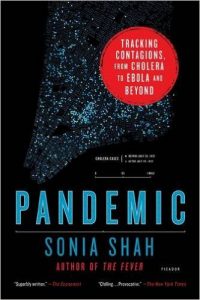 (or not doing!) to stop them. The book is structured according to human behaviors vis-a-vis diseases, and also uses cholera as a particular case of a disease with which to weave together the general complexity of epidemiology. I found the overall book a bit disjointed, though many individual parts were quite enjoyable. That said, overall I would’ve liked a bit more depth, especially in the sections concerned with policy.
(or not doing!) to stop them. The book is structured according to human behaviors vis-a-vis diseases, and also uses cholera as a particular case of a disease with which to weave together the general complexity of epidemiology. I found the overall book a bit disjointed, though many individual parts were quite enjoyable. That said, overall I would’ve liked a bit more depth, especially in the sections concerned with policy.
The Pope of Physics
On the one hand, I enjoyed this book. On the other, for such an important and 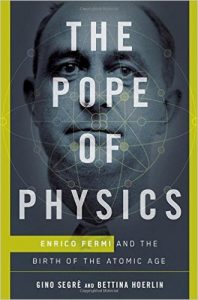 fascinating character as Fermi, I couldn’t help but think this book was a bit of small beer. I would’ve happily enjoyed a book three times its length. Relatedly, I would’ve liked fewer asides about the general aspects of the Manhattan Project. Perhaps there’s no good way to get all the info now, but I would’ve loved to get a stronger feel for all those deathbed conversations with great and controversial thinkers.
fascinating character as Fermi, I couldn’t help but think this book was a bit of small beer. I would’ve happily enjoyed a book three times its length. Relatedly, I would’ve liked fewer asides about the general aspects of the Manhattan Project. Perhaps there’s no good way to get all the info now, but I would’ve loved to get a stronger feel for all those deathbed conversations with great and controversial thinkers.
I don’t want to say it’s a bad book – in fact it might be the best Fermi biography available. It also has the incidental point of interest that one of the authors is the nephew of Emilio Segrè, which may explain why the sections about Fermi’s friends were some of the best and most detailed of the book. If you, like me, enjoy biographies from the Heroic Age of Physics, it’s definitely worth a read.
Elbow Room
Okay, so I’ve wanted to read a book on compatibilism (the belief that “free will” and a deterministic universe are compatible). This seems crazy to me, and I trust the reasons are obvious.
So, I read this book, and my honest initial reaction was disappointment. A lot of 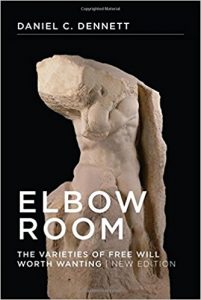 the book is spent talking about computer, biology, evolution, and so forth, which to me seems like a sort of sideshow. If so, it’s an especially egregious sideshow, since Dennett frequently complains of perilously misleading elements stuck into philosophical theories.
the book is spent talking about computer, biology, evolution, and so forth, which to me seems like a sort of sideshow. If so, it’s an especially egregious sideshow, since Dennett frequently complains of perilously misleading elements stuck into philosophical theories.
That said, as I thought it over and discussed it more with people, I got the basic idea, which (to simplify drastically) isn’t so much that you can have free will in a deterministic universe, but that your idea of what free will means is probably wrong. I don’t want to go too in depth in this review, but as a way to think about it, try to consider what the basic physical rules would be for a universe that permitted your intuitive notion of free will. It’s hard to think of anything that doesn’t posit some cheat that just asserts that you do.
In short, I didn’t get the hit of wild enlightenment I was hoping for. Unusually for me, I learned something, yet left disappointed. I will illustrate by the use of what I’ll call Two Dialogues Concerning Free Will.
Dialogue 1:
Mom: Hey, you wanna see a DINOSAUR?!
Kid: but isn’t that impossible?!
Mom: come with me!
[Cut to: Park]
Mom: Meet the pigeon! You know, according to science, birds are living dinosaurs!
Kid: But I wanted a T. Rex!
Mom: Jesus, kid. Obviously that was never gonna happen.
Dialogue 2:
Compatibilist: Hey, you wanna see me combine free will and determinism?!
Zach: Sure thing! But how?
Compatibilist: I’ll show you!
[Cut to: Zach reading book]
Zach: So determinism is still true, but individuals appear to have choices, and we can call that free will if we like?
Compatibilist: Yeah. What? Did you think I was going to claim an individual human could defy causality itself?
Zach: I thought maybe-
Compatibilist: By Descartes’ beard, you’re dumb!
–End of Scene–
So, that’s where I am now on this. Like the kid at the park, I’m not disagreeing with the idea that my initial notion of the subject matter was flawed. I’m just annoyed at the way the exciting revelation was presented.
Age of Anger
So first, the good: this is a beautiful book, and Mishra has a wonderful command of literature, especially revolutionary literature of the 18th and 19th century. In this book he describes how the present “age of anger” can be understood in terms of those centuries – how the death of old institutions (e.g. religion, tribe) in favor of a commercial world that most people will fail in, results in a deep state of nihilism and longing, which can manifest in anarchy, fascism, and violence.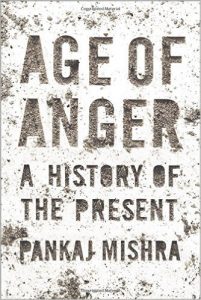
Literary snobbish types (such as myself) tend to enjoy this sort of thing. I mean, he’s explaining Trump in terms of Nietzsche! And he does it with the flair and verve of Lenin. He has that old style of writing, recently revived, in which all of society and history can be explained if you just grok a few basic ideas about history and human nature.
The problem is I’m not sure it’s true. Partially, I’m a bit biased against this book, having recently read Graeme Wood’s delightful “The Way of Strangers” about understanding ISIS. This is relevant because Mishra frequently cites ISIS as a manifestation of the product of human dislocation in the modern world.
In a way, Wood’s theory can be brought along with Mishra’s – both note that ISIS fighters are frequently young people, often criminals, who know nothing about Islam. In fact, both Mishra and Wood point out the stories of ISIS fighters reading “Islam for Dummies.” But, Wood makes a point that is very contra to Mishra – that we make a mistake if we try to center all this around Europe and the rise of commerce, to the extent that we neglect the fact that Salafis really actually believe their religion.
More importantly to the dorky part of my brain, I have trouble with Mishra’s ideas when I look around the world. Are things bad? In many ways, yes. Trump freaks me out. It may be the case that racists and race separatists are more open with their views.
On the other hand, if Mishra is right and we live in an especially nihilistic world, where old institutions are all collapsing as we spend all our time on social media coveting each others’ lives… why isn’t the modern world more violent than the past? It’s not as if you find a world of peace in those past ages where religion and tribal allegiance reigned. Maybe Voltaire was kind of a prick, and maybe the Enlightenment wasn’t on behalf of the common man, but were the crusades or the Inquisition these things either?
For a book so well-versed in the past, it seems to paint the present as overly important. For example, toward the end of the book, Mishra talks about McVeigh’s experience of the death of the American dream during the economic crises starting around 1970. Sounds interesting, sounds plausible. Except, well, consider any other 40 or so year period. Do you find it devoid of conflict and economic desolation? 1930-1970? 1890-1930? 1850-1890?
Of course not.
Capping things off, Mishra makes what I am starting to call the Argumentum ad Trumpum fallacy. To wit – that anything can be gleaned about society from the bare fact that Trump won.
Is American society descending into chaos and dislocation? Into race hatred and cataclysm? I mean, maybe, but how does Trump prove it? But for a few coincidences in one or two states, he lost. I’m not saying he won unfairly – I’m saying that, so to speak, there are (let’s say) 40 in 100 universes where he lost. In those universes, one assumes, the Mishras of the world don’t say “actually, I was wrong about society, and the election of this moderate Democrat proves it.”
His Argumentum ad Brexitum falls similarly discordant on my ears. Brexit barely won, and most of its supporters were older Brits, not young angry radicals. How in the world does Brexit show a world withdrawing into itself? Again, it was tight enough that the outcome could well have been decided by a couple of days of bad weather during the voting period. Without Brexit, does the argument change?
Mishra also puts force this idea that global anomie stems from a sort of halt to the promised progress of humanity that the Enlightenment promulgated. Is this true? Not really. It may well be true for the Western middle class (writ large) who’ve generally suffered due to globalization? But, worldwide, the average worker is better off than ever. Poverty and hunger are falling. Snapchat has nifty Internet-glasses. Where is the purported halt to progress?
In short, I wanted to see some stronger stats (or maybe some stats at all). Nothing major. Just, maybe a rule that every time you say ressentiment or amour propre in reference to the feelings of an entire people, you oughta make a nice graph or something.
All that said, I did enjoy this book. If you want a window into what people who read The New Yorker while nodding their heads knowingly are thinking about the present moment, this is a very pretty way to get it.
The Complete Maus
Dammit, this book is perfection. I hope I write something this good someday.
It’s the story of Spiegelman’s father Vladek, and his experiences during the Holocaust. The story is framed by an equally compelling collection of interactions between Spiegelman and his father as the former collects these stories in order to create the comic book. This book is rightfully considered a classic, and I’m glad I finally got around to it. Time to do a Spiegelman dive.
The Patriarch
A solid and in-depth biography of Joseph P Kennedy, patriarch of the famed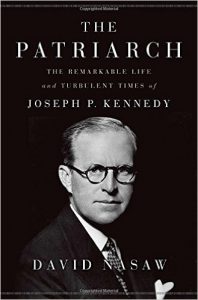 Kennedy political family. It’s an interesting angle on an interesting person, and it provides a lot of understanding of the Kennedy brothers, while also dispelling some persistent myths about Joseph P. Highly recommended if you’re curious about him or about his family.
Kennedy political family. It’s an interesting angle on an interesting person, and it provides a lot of understanding of the Kennedy brothers, while also dispelling some persistent myths about Joseph P. Highly recommended if you’re curious about him or about his family.
Narconomics
Oh man, I enjoyed the crap out of this book. It’s basically a surprisingly brave business/econ reporter discussing the economics of illegal drugs. Like, for instance, he talks about how we keep fighting the supply side of drugs, which just 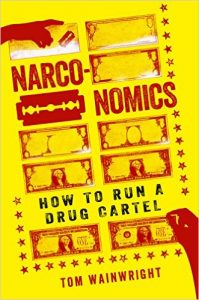 drives up the price. There’s also a really interesting discussion of how law enforcement groups calculate the value of drug busts. In short, they don’t calculate the value to the cartel, but rather the street value. The author notes that this is sort of like calculating the value of a cow by seeing the price of a steak at a Manhattan restaurant.
drives up the price. There’s also a really interesting discussion of how law enforcement groups calculate the value of drug busts. In short, they don’t calculate the value to the cartel, but rather the street value. The author notes that this is sort of like calculating the value of a cow by seeing the price of a steak at a Manhattan restaurant.
Anyway, yeah, really interesting. Wainwright, like just about everyone who looks into this topic deeply, comes out in favor of legalization.
Chaos Monkeys
Read this one. I don’t know if I love it or hate it or both, but Martinez is a delight. 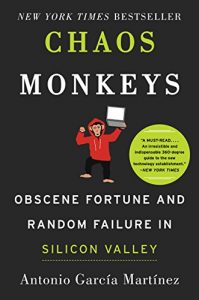 By his own admission, he’s somewhat playing a character as he recounts his days in the Silicon Valley startup seen, and later at Facebook. This is a sort of tell-all book of gossip, but it’s made enjoyable by the fact that Martinez is (openly) attempting to be Michael Lewis. The writing is quite good, and Martinez makes a point of showing off his liberal arts education, in a way that almost reminded me of Nabokov.
By his own admission, he’s somewhat playing a character as he recounts his days in the Silicon Valley startup seen, and later at Facebook. This is a sort of tell-all book of gossip, but it’s made enjoyable by the fact that Martinez is (openly) attempting to be Michael Lewis. The writing is quite good, and Martinez makes a point of showing off his liberal arts education, in a way that almost reminded me of Nabokov.
It’s a strange book, and will leave you feeling a bit slime-coated at times, but I can’t help but think in 50 years, when the Golden Age of Silicon Valley is being recounted in college classrooms, a playful professor will enjoy assigning this book as a more true portrayal than that in history books.
